It is often asked, around our office at least…”if it’s not in my calendar, does it even exist at all?” Indeed we hear the same sentiment from ECAL users time and time again.
So, the benefits of communicating to the calendar seem to make great sense, right? Avoid the inbox chaos, deliver your message to users, at the ‘right time’, in the ‘right place’. Makes total sense.
And we know that the modern consumer is increasingly mobile, they are always connected to the internet, they are forever “busy”…so “busy”, and managing life is hard enough!
So how does the modern consumer keep on top of it all? Exactly to what extent do they rely upon their ‘digital calendar’ to manage “life”. Exactly how many manage life via their personal digital calendar, compared to say, keeping a wall calendar, a diary or journal?
Well, we have the answers!
We surveyed 1,000 people (aged 18-64) in each of the US, UK and Australia. The sample was representative of the population.
The Question: What do you rely upon most to manage your daily schedule?
United States

United Kingdom

Australia

Some further insights reveal that:
* In UK, over 62% of 18-14 year-olds use their mobile calendar
* In Australia, 25-34 (59.5%) and 18-24 (57.7%) year-olds are most likely to use their mobile calendar
* In US, 63% of 55-64 year-olds use a digital calendar (mobile or desktop) rather than paper (37%)
* Women use paper diaries / journals / planners more than men

By Chris Smith, Forbes, June 10, 2016

Next week the Premier League will at long last unveil its 2016-17 league schedule. It’s a much-anticipated occasion, which is perhaps best highlighted by the number of rumored schedule leaks (and the flood of accompanying headlines) that have hit the internet in recent weeks. But what’s truly different this time around is that the English league will be putting a new twist on its schedule reveal: Thanks to a new partnership with ECAL, an interactive calendar marketing platform, fans will now be able to add the fixtures to their calendars with just a few clicks.
“We started to think about the personal calendar space as a new communications channel,” says ECAL founder and CEO Patrick Barrett, “and what we’ve found is it’s an incredibly effective method of communication.”
What does that mean for fans? ECAL’s technology will allow soccer fans to instantly sync the Premier League’s schedule with their personal calendars, no matter whether they use Outlook, Google GOOGL -1.27% or mobile calendars fromApple AAPL -1.06% and Android. In addition to adding game dates to their calendars, fans will also be able to schedule league events, important dates and even buy game tickets. Barrett notes that bypassing the inbox provides “100% delivery,” and the content is totally relevant – “the content choice is in the hands of the consumer.”
Though next week’s schedule reveal will mark the start of ECAL’s league partnership, it won’t be the company’s first step into English soccer. Last season Tottenham Hotspur partnered with the company, and that relationship offers a good idea of what Premier League fans will have in store. Go to the London team’s schedule page and you’ll find the option to sync to your calendar:

Clicking that button offers nine different schedules to add to your calendar, ranging from match days to ticket on-sale dates to even an “On This Day” option. Barrett notes that while game dates are obviously the most subscribed to, those other options are surprisingly popular. Last year ticket on-sale dates were subscribed to by 40% of users, while club events garnered around 30%.
And English soccer fans aren’t the only sports nuts who can benefit from ECAL’s technology. Barrett says the company currently does more business in the US than anywhere else, and it counts the New England Patriots, Washington Redskins, Boston Celtics and Columbus Blue Jackets among its partners (plus major college athletic programs like Duke and Notre Dame). The USGA has joined on, and the NHL has used ECAL for its postseason schedule. Major League Soccer is also a partner, as are all 20 teams – great news for ECAL, which counts each team as an individual account.
“We’re seeing incredible metrics,” says Barrett of measurements like click-throughs and purchases, and a recent test run for this summer’s Copa America backs that claim up. ECAL leveraged its MLS deal to partner with the international soccer tournament, and earlier this year the company ran a single-match test. In the space of a month the tournament picked up 53,000 ECAL subscribers and sold more than $63,000 in tickets for that single match.
Perhaps the best news for teams and leagues is that ECAL’s technology grants direct fan engagement while remaining eminently affordable. ECAL receives a base monthly fee – pro sports teams and leagues fall into the enterprise category of the company’s pricing, which typically means a fee in the range of $400 per month – and then additional fees scale according to usage, essentially at a few pennies per user.
All told, for even a popular team like Tottenham the annual cost comes in at less than $10,000 per year, hardly a tough price to pay for the team with revenues of $310 million. And the payoff? Tremendous. Thanks to thousands of impressions, click-throughs and ticket sales, Barrett says that brands have returned anywhere from 30- to a staggering 300-times their investment.
View the article here: https://ow.ly/apq03018yE7
ECAL has partnered with Big Bash League (Cricket Australia) and oOh! to build an interactive app which allows shoppers to sync the game schedule of their favourite Big Bash League team to their smartphone calendar. This sync also allowed the shopper to receive match alerts, ticket information, TV broadcast information, videos and social media links via their calendar.
Published: Eric Fisher; Sports Business Journal; 28 September 2015.
Evolving technologies are changing the game in fan engagement.
ECAL: Getting on the calendar.
“Most every platform within digital media from Web pages and email to social media and mobile alerts, has long been mined for marketing purposes, many to the point of user fatigue. But the element on any smartphone or computer that many users rely on and use the most on any given day – the calendar function – has stayed largely untouched.
Until now.”
Read the full article below to see how ECAL is changing the game in consumer engagement!
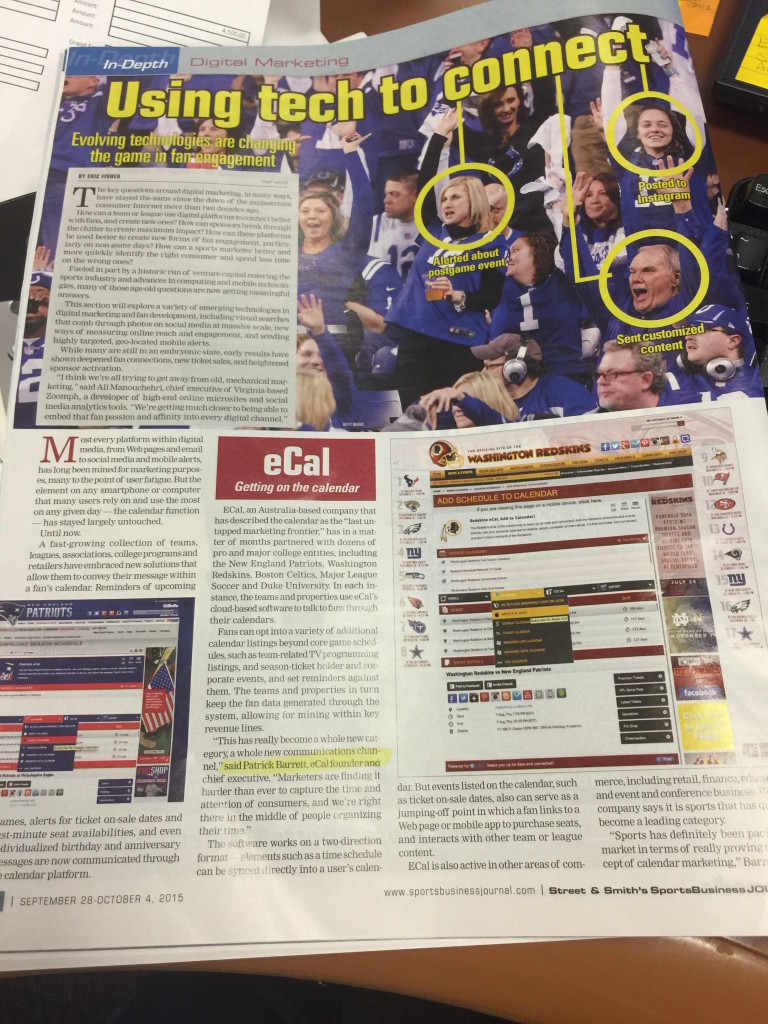
See the Sports Business Journal website here (sign up for a free trial subscription)
With the release of the new Apple Watch in-stores, we just had to get one…for R&D of course! The great news is that ECAL events, calendars and alerts sync very well with the Apple Watch.
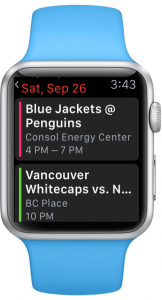
All your favourite sports schedules, fitness classes, education curriculum, TV programming, powered by ECAL…straight to your wrist, in a really nice display!
The calendar has a range of displays. A ‘month’ view, ‘list’ view and ‘day’ view. Tap into an event to see a detailed ‘event details’ view.
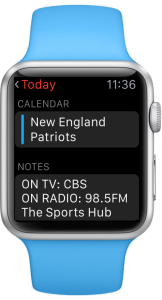
What is noticeable, is that the calendar is very accessible on the watch, and easy to use. Along with the clock (yes, it tells the time!), and the daily activity tracker, the calendar is a real mainstay of the watch experience.
The ‘glances’ feature (a ‘quick view’ dashboard showing a range of important updates) is a quick way to see ‘what’s on’. The first swipe will show you the next event coming up; Tap and you will see events for the next week; Tap again to dive into the event details.
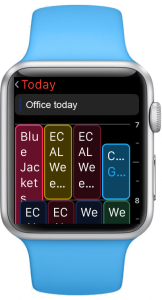
You can also access the full calendar from the Calendar app on the home screen display.
Event alerts are instantly displayed on the screen, with a vibration (more of a mild ‘thump’) to let you know. What’s best, I can’t help thinking about the ‘dynamic bars’ of the ECAL logo when I look at the various events, as they are all nicely colour coded. Very cool.
Unfortunately the quick links in the event details (eg: Buy Tickets, Video, Latest News etc) are not clickable from the watch, as Apple Watch doesn’t have a browser….yet.
Although the Apple Watch is really just a pairing device for your iPhone (your phone has to be within 10m), it is very useful and seems to ‘makes sense’. The calendar is a really nice experience, it ‘chunks’ the calendar down into easy to view event ‘bites’, in order to give me a great view of what’s coming up.
The calendar, once seen as a separate piece of logic, is now so much more integrated than that, and the watch demonstrates this really well. It makes sense right, it’s a watch! The calendar is fast becoming the default tool for which we all manage time, and as such a great conduit for time based alerts, “right-time communications”.
There’s lots to explore on the watch, it’s pretty cool. There are some great apps. Twitter has voice recognition for making tweets, there’s Siri, some cool watch faces, and a camera. You can even be like ‘Dick Tracy’ and make calls. I like it. For mine, the Apple Watch is a winner.
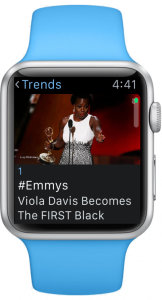
When it comes to checking in on favorite teams, most sports fans turn to their desktop computer and not their mobile device, That according to new data out from ECAL which shows nearly three-quarters (73%) of sports fans are using their desktop to check on the schedules and calendars of their favorite teams.
Other interesting findings from the ECAL survey include:
• 26% of fans use their mobile device to check the calendar of their favorite teams
• Of those connecting via mobile nearly half (49%) are using iPhones and 46% use Android devices
• 17% of NFL fans synch their teams’ calendars (Android) while 12% did so via iPhone
• 73% of college sports fans connect via desktop and 25% via mobile device
“The ECAL platform gives us valuable insight into how sports fans prefer to receive events-based communications, what calendar programs they use, who they are, and how they behave within the calendar space,” said Patrick Barrett, Founder and CEO of ECAL. “We see very high levels of engagement from the calendar space (via click-throughs) for generally high value items (such as buying tickets). We also expect to see the continued rise of the mobile device as the primary way to manage your important life schedule.”
The survey focused on soccer and American football. Researchers found that 70% of soccer fans connect via desktop while 67% of NFL fans connect via desktop.
Calendar marketing software ECAL is helping professional and amateur sports team connect with their fans via personal digital calendars and is also shedding light on the digital habits of sports fans.
The ECAL platform, which is leveraged by teams like the Chicago Bears, USA Volleyball and more than 28 international soccer teams, enables fans to choose what information they would like to receive from their favorite teams, such as match schedules, events, team and athlete appearances, gear sales and other information. In fact, more than 600,000 fans across the globe use the ECAL dynamic calendar service to connect with their favorite teams. The solution actually provides a unique way for brands to interact with their fans, as it enables them to bypass the inbox where content has a lot of competition, and share events directly with fans via personal calendars.
It is also important to note that ECAL recently revealed the findings of its March Sports Analytics Report, which sheds light on the digital habits of sports lovers. According to the data 73 percent of fans prefer to connect to their favorite teams via desktops, 26 percent prefer mobile devices and the rest prefer Facebook or other methods. Additional data shows that out of the fans who connect via mobile, iPhone is the most popular platform (49 percent), followed by Android (46 percent). Moreover, the data found that fans are interested in connecting via calendars, with the data revealing 70 percent of soccer fans connect via desktop calendars, compared to 67 percent of NHL fans and 73.5 percent of college sports fans. While this data isn’t relevant for all industries, it is important for every industry to know how their audience prefers to connect with their brand.
”The ECAL platform gives us valuable insight into how sports fans prefer to receive events-based communications, what calendar programs they use, who they are, and how they behave within the calendar space,” said Patrick Barrett, Founder and CEO of ECAL. “We see very high levels of engagement from the calendar space (via click-throughs) for generally high value items (such as buying tickets). We also expect to see the continued rise of the mobile device as the primary way to manage your important life schedule.”
IT SCIENCE: Duke eCal adds sports schedules directly into the personal calendar of those who sign up. It’s free of charge and dynamic.
At eWEEK, our goal is encapsulated in our tagline: “Stay Ahead of the IT Curve.” We do exactly this for readers by publishing 20 or more articles each business day about relevant IT news and perspectives, innovation, trends, noteworthy ideas from thought leaders and best practices from throughout the realm of IT.
What we also do is to explain how new-gen IT works in the real world on systems old and new. We call these IT Science stories, because they’re about IT in the real world, and science is the real world. With all the innovation in products and services and new companies springing up to deliver them, there are a lot of stories to tell.
Here is one rather timely IT Science use case: How Duke’s athletic department improved engagement with its alumni and fans and sold its television platform at the same time. It’s timely because earlier this week, the Blue Devils won their fifth NCAA men’s basketball championship with a hard-fought 68-63 victory over Wisconsin at Lucas Oil Stadium in Indianapolis.
Duke is using a new mobile calendar app called eCal to connect its retail, ticket and television products to alumni and fans. Duke eCal adds sports schedules directly into the personal calendar of those who sign up. It’s free of charge and dynamic, so fans receive updates automatically as they happen.
Users can post notes to Facebook, Twitter or Google+ networks on games they’re watching, invite friends to the game (or to watch it on streaming video), buy apparel or DVDs of past televised events—all using the app, which is available for iOS and Android mobile devices. It’s pretty much an all-in-one engagement app.
The department of athletics had been progressive in using IT tools such as its Website and mobile apps to interact with its many fans in order to keep them informed about game schedules, ticket availability and sales, subscriptions to its video platform, and sales of apparel and other types of retail items.
Eventually, the IT staff in the athletic department found that centralizing all these functions in order to make Duke’s engagement with fans easier to manage was going to be necessary. So they set out to refresh its splintered platform. Here is how they did it.
Objectives: Duke athletics and digital platform provider Neulion selected eCal to engage Duke fans around the Duke sports schedules, with the primary goal to drive use and subscriptions to the Blue Devil Network video platform.
The solution: The Duke eCal is geared to engage fans easily and directly with the BDN video platform. As such, the reminders, messaging and links are all tailored to suit these specific business objectives.
Content: Duke fans can choose their favorite sports schedules, across men’s and women’s sports, as well as for home and away games. They then can select and buy pay-per-view telecasts of those events on demand.
Marketing and promotion: The Duke eCal has been integrated on the Duke Athletics Website, on the home page and with the sports schedules. No launch promotion has taken place yet.
Results thus far this year:
–5,494 subscribers.
–99 percent opt-in rate: Customers consent to receive other marketing communications.
–329,000 calendar impressions: Events content is delivered at the right time in the right place 100 percent of the time.
–Clickthroughs: More than 80 percent of clicks are to Join BDN, the Duke online TV platform.
–Sales: eCal is proving to actively drive new online TV subscription revenue: Value is generated in a deeper fan engagement, superior customer service and alumni connection.
“The Duke eCal looks great and is a simple tool for fans to stay totally connected with Duke sports, wherever they are,” said Ryan Craig, director of digital media at Duke Athletics. “Any schedule changes are delivered straight into their calendar. From a business perspective, we are seeing terrific clickthrough to our online assets, particularly the BDN video platform to drive additional revenue.”

